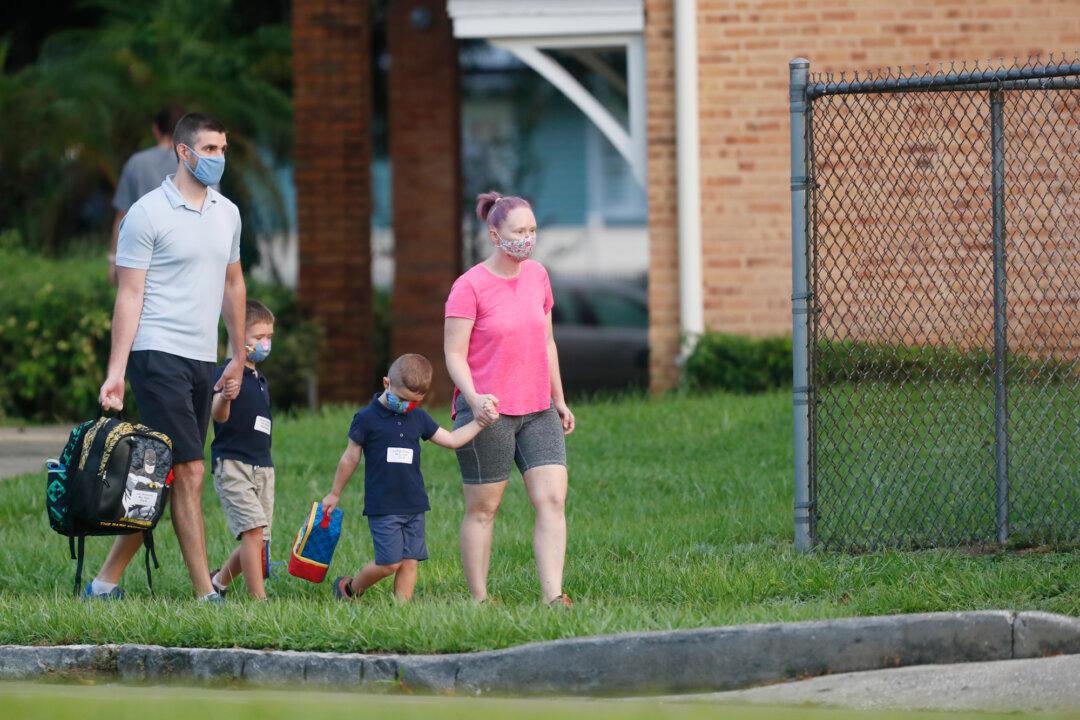PUNTA GORDA, Fla.–The Florida Department of Education (DOE) in an emergency meeting on Friday unanimously passed two orders to prop up the state’s recently enacted Bill of Parental Rights.
The first order provides a mechanism to transfer a child to a private school or another school district under a scholarship when a student is subjected to harassment tied to a school district’s COVID-19 mitigation protocols. The scholarships in question, called Hope Scholarships, are funded mostly by new car sales with eligible sales tax contributions.Before the department’s board voted, DOE Vice-Chair Ben Gibson said that the intent of the rules they were trying to pass was make sure districts follow the law.
“We don’t want to hurt kids,” Gibson said in the meeting. “Both the Department of Health and the DOE rules work together to prop up the governor’s executive order and parental choice. This is another tool in our toolbox to ensure school districts follow the law.”
Florida’s First Lady Casey DeSantis weighed in on the board’s decision through a written statement.
“I commend the State Board of Education for providing clear instruction that a student will be eligible for a Hope Scholarship if COVID-19 related harassment occurs—a proactive step to ensure clarity in our shared commitment to protect the rights of students and families.”
The same day, the Florida Department of Health passed a rule (pdf) requiring a number of COVID-19 safeguards for Florida schools, including frequent cleaning of classrooms and hand-washing for students. Alongside protocols for students who have caught the virus and those who have been exposed to it, the rule requires schools to allow parents to opt children out of having to wear a mask.
Not all are happy with the new rules. Florida State Rep. Gary Farmer (D) said that the governor’s executive order is unconstitutional and that the DOE has violated state law.
In an open letter to DOE Commissioner Richard Corcoran, Farmer reminded the commissioner and the board members that they “swore an oath to serve the people of Florida and was not an oath of allegiance to the Governor.”
According to Farmer, Florida’s rulemaking statutes require that prior to an agency adopting or amending a rule, the agency must provide notice of its intended action, including an explanation of its purpose, effects, and estimated regulatory costs. This notice must be published in the Florida Administrative Register not less than 28 days prior to the intended action. Other requirements also mandate the DOE to provide a detailed written statement of the facts and circumstances justifying the proposed rule followed by public hearings and published intent within 21 days.
“It is abundantly clear that the task set before you by Governor DeSantis is nothing more than an attempt to take advantage of our current public health crisis by siphoning even more money away from our public schools, in direct violation of Florida’s Statutes and its Constitution,” Farmer wrote.
Gov. Ron DeSantis, a Republican, approved of the board’s decision.
“Giving parents options to make these decisions is not controversial. I’m proud that today we took action to make sure school administrators respect parents’ rights to make educational and healthcare decisions for their families,” DeSantis said in a statement.
The Florida Parents’ Bill of Rights (pdf) guarantees parents and legal guardians a number of rights with respect to their children’s education and upbringing. It prohibits the state or any other entity from interfering with parental choices or decisions. Among a number of other provisions, the law gives parents the right to inspect educational materials and to exempt their children from immunizations.



